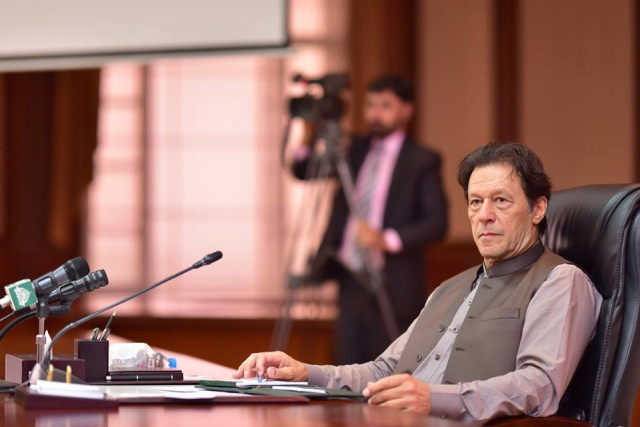PM Imran's revenue authority plan faces resistance
Heads of FBR’s 23 field formations are against government’s plan

PM Imran Khan. PHOTO: PID
Heads of FBR’s 23 field formations, their members and other senior officers spoke against the government’s plan of setting up the PRA by June 2020, according to sources in the FBR. The top-ranking officers expressed their frustration in front of FBR Chairman Shabbar Zaidi during a meeting of chief commissioners.
Zaidi wants to build the FBR on modern lines with focus on data collection and automation, which has the potential of cracking the monopolistic role of taxmen besides abolishing many outdated jobs including that of the chief commissioner - the much sought-after grade-21 field post.
The chairman wants to bring an end to physical contact between the taxman and the taxpayer.
FBR’s Inland Revenue has 23 field formations in all major cities of the country headed by a chief commissioner. The post of chief commissioner is administrative in nature while legal powers rest with the commissioner, who is a grade-20 officer.
The new plan includes empowering the commissioner by abolishing the chief commissioner post.
Threatened by the new restructuring plan, the FBR’s top hierarchy has stood against the proposal and refused to accept it while terming the plan yet another potential experiment that is bound to fail.
The meeting in the FBR was held days after PM Imran approved a three-year tax administration restructuring plan with the deadline of June next year for establishing the PRA, and restructuring the FBR in the interim period.
The plan included country-wide surveys, integration of federal and provincial collection of general sales tax on goods and services under the PRA umbrella and eventually enforcing the value added tax.
However, the plan had been approved secretly at the PM House a month ago where only the FBR chairman was present.
The FBR chairman had not taken his team into confidence before approval of the plan, which also became a reason for resentment in the tax machinery, a senior FBR official told The Express Tribune on Monday.
The FBR’s top hierarchy raised questions about legal mandate of the authority to collect taxes on behalf of the federal government, security of their service under the authority and abolition of grade-21 posts of chief commissioners, they added.
“Discussions on the PRA have just begun and I hope that I will be able to convince the FBR people,” said Zaidi when contacted for his views.
The chairman said in case the officers did not accept the proposal, the government could show some flexibility.
“The current system of the FBR is archaic and highly bureaucratic, which does not commensurate with the technology-driven tax administration in vogue around the world,” according to PM Office documents.
PM Imran in the past has warned the FBR on multiple occasions to improve its work or else he will abolish the organisation. However, the FBR officers have privately complained that they have been singled out despite performing the critical job of tax collection.
The FBR officers said the premier did not do anything about police reforms but was targeting only the FBR despite its role in the national economic security.
These decisions have created resentment in the FBR as the officers believe that they are being unreasonably targeted by all without appreciating their efforts to achieve a double-digit growth in revenues in the midst of a slowing economy. The FBR officers complained to the chairman that they were not taken into confidence before approving the plan.
“We are the biggest stakeholders and the government made the decision by keeping us in the dark,” said a senior FBR officer while speaking on condition of anonymity.
The top taxmen plainly told the FBR chairman that the PRA plan was not a very well-thought-out scheme and it would increase trouble instead of addressing the issues, according to people familiar with the discussions that took place on Monday.
The FBR officers’ viewpoint was that their efforts were undermined by weakening the political will to tax the influential sectors but the blame was thrown on the tax machinery.
The Pakistan Tehreek-e-Insaf (PTI) government that had promised to go after the influential people to tax them reached a compromise with the traders on the intervention of its former secretary general Jehangir Khan Tareen.
On the insistence of the International Monetary Fund (IMF), the federal government had set the FBR’s tax collection target at Rs5.5 trillion or 12.4% of gross domestic product, requiring an impossible growth of 44% over the previous year’s collection.
But from July through October, the FBR provisionally collected Rs1.28 trillion in taxes and fell short of its four-month target by Rs167 billion. The FBR was supposed to collect Rs1.447 trillion in July-October of the current fiscal year.
The Rs1.28-trillion collection was 16% or Rs176 billion higher than the previous year.
The FBR chairman asked the taxmen to defend their decision of maintaining the status quo in light of the poor performance. During the meeting, he pointed to a very low number of Lahore-based traders who filed their tax returns.
Published in The Express Tribune, November 5th, 2019.
Like Business on Facebook, follow @TribuneBiz on Twitter to stay informed and join in the conversation.



















COMMENTS
Comments are moderated and generally will be posted if they are on-topic and not abusive.
For more information, please see our Comments FAQ